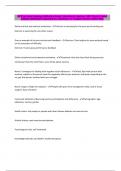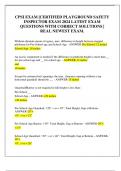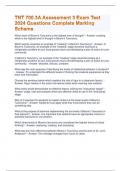-
1. Exam (elaborations) - Ace chapter 3 questions with 100% correct answers | verified | latest update 2024
-
2. Exam (elaborations) - Ace personal trainer exam study guide| questions & answers (100 %score) latest update...
-
3. Exam (elaborations) - Ace personal trainer final exam study guide| questions & answers (100 %score) latest ...
-
4. Exam (elaborations) - Ace personal trainer flashcards | questions & answers (100 %score) latest updated 202...
-
5. Exam (elaborations) - Ace personal trainer manual | questions & answers (100 %score) latest updated 2024/20...
-
6. Exam (elaborations) - Ace personal trainer question bank | questions & answers (100 %score) latest updated ...
-
7. Exam (elaborations) - Ace personal trainer review | questions & answers (100 %score) latest updated 2024/20...
-
8. Exam (elaborations) - Ace personal trainer review | questions & answers (100 %score) latest updated 2024/20...
-
9. Exam (elaborations) - Ace personal trainer study guide | questions & answers (100 %score) latest updated 20...
-
10. Exam (elaborations) - Ace personal trainer study set | questions & answers (100 %score) latest updated 2024...
-
11. Exam (elaborations) - Ace personal trainer test | questions & answers (100 %score) latest updated 2024/2025...
-
12. Exam (elaborations) - Ace personal training certification exam | questions & answers (100 %score) latest up...
-
13. Exam (elaborations) - Ace personal training certification practice test | questions & answers (100 %score) ...
-
14. Exam (elaborations) - Ace personal training | questions & answers (100 %score) latest updated 2024/2025 com...
-
15. Exam (elaborations) - Ace practice exam | questions & answers (100 %score) latest updated 2024/2025 compreh...
-
16. Exam (elaborations) - Ace practice exam #2 | questions & answers (100 %score) latest updated 2024/2025 comp...
-
17. Exam (elaborations) - Ace practice exam 1 | questions & answers (100 %score) latest updated 2024/2025 compr...
-
18. Exam (elaborations) - Ace practice exam | questions & answers (100 %score) latest updated 2024/2025 compreh...
-
19. Exam (elaborations) - Ace pt exam | questions & answers (100 %score) latest updated 2024/2025 comprehensive...
-
20. Exam (elaborations) - Ace pt final exam | questions & answers (100 %score) latest updated 2024/2025 compreh...
-
21. Exam (elaborations) - Ace quiz | questions & answers (100 %score) latest updated 2024/2025 comprehensive qu...
-
22. Exam (elaborations) - Ace 5th edition all chapters | questions & answers (100 %score) latest updated 2024/2...
-
23. Exam (elaborations) - Ace certified personal training exam | questions & answers (100 %score) latest update...
-
24. Exam (elaborations) - Ace chapter 1| questions & answers (100 %score) latest updated 2024/2025 comprehensiv...
-
25. Exam (elaborations) - Ace chapter 2 | questions & answers (100 %score) latest updated 2024/2025 comprehensi...
-
26. Exam (elaborations) - Ace cpt exam study guide | questions & answers (100 %score) latest updated 2024/2025 ...
-
27. Exam (elaborations) - Ace exam | questions & answers (100 %score) latest updated 2024/2025 comprehensive qu...
-
28. Exam (elaborations) - Ace exam guide | questions & answers (100 %score) latest updated 2024/2025 comprehens...
-
29. Exam (elaborations) - Ace exam prep | questions & answers (100 %score) latest updated 2024/2025 comprehensi...
-
30. Exam (elaborations) - Ace exam | questions & answers (100 %score) latest updated 2024/2025 comprehensive qu...
-
31. Exam (elaborations) - Ace final exam | questions & answers (100 %score) latest updated 2024/2025 comprehens...
-
32. Exam (elaborations) - Ace final practice exam | questions & answers (100 %score) latest updated 2024/2025 c...
-
33. Exam (elaborations) - Ace final test | questions & answers (100 %score) latest updated 2024/2025 comprehens...
-
34. Exam (elaborations) - Ace fitness personal trainer exam | questions & answers (100 %score) latest updated 2...
-
35. Exam (elaborations) - Ace group fit | questions & answers (100 %score) latest updated 2024/2025 comprehensi...
-
36. Exam (elaborations) - Ace group fitness practice exam | questions & answers (100 %score) latest updated 202...
-
37. Exam (elaborations) - Ace group fitness | questions & answers (100 %score) latest updated 2024/2025 compreh...
-
38. Exam (elaborations) - Ace personal trainer chapter 7 | questions & answers (100 %score) latest updated 2024...
-
39. Exam (elaborations) - Ace personal trainer chapter 2 | questions & answers (100 %score) latest updated 2024...
-
40. Exam (elaborations) - Ace personal trainer chapter 3 | questions & answers (100 %score) latest updated 2024...
-
41. Exam (elaborations) - Ace personal trainer chapter 4 | questions & answers (100 %score) latest updated 2024...
-
42. Exam (elaborations) - Ace personal trainer chapter 5 | questions & answers (100 %score) latest updated 2024...
-
43. Exam (elaborations) - Ace personal trainer chapter 7 | questions & answers (100 %score) latest updated 2024...
-
44. Exam (elaborations) - Ace personal trainer chapter 8 | questions & answers (100 %score) latest updated 2024...
-
45. Exam (elaborations) - Ace personal trainer chapter 10 | questions & answers (100 %score) latest updated 202...
-
46. Exam (elaborations) - Ace personal trainer chapter 11 | questions & answers (100 %score) latest updated 202...
-
47. Exam (elaborations) - Ace personal trainer chapter 12 | questions & answers (100 %score) latest updated 202...
-
48. Exam (elaborations) - Ace personal trainer chapter 13 | questions & answers (100 %score) latest updated 202...
-
49. Exam (elaborations) - Ace personal trainer chapter 14 | questions & answers (100 %score) latest updated 202...
-
50. Exam (elaborations) - Ace personal trainer chapter 16 | questions & answers (100 %score) latest updated 202...
-
51. Exam (elaborations) - Ace personal trainer chapter 17 | questions & answers (100 %score) latest updated 202...
-
52. Exam (elaborations) - Ace personal trainer chapter 18 | questions & answers (100 %score) latest updated 202...
-
53. Exam (elaborations) - Ace personal trainer exam prep 195 questions | questions & answers (100 %score) lates...
-
Show more






